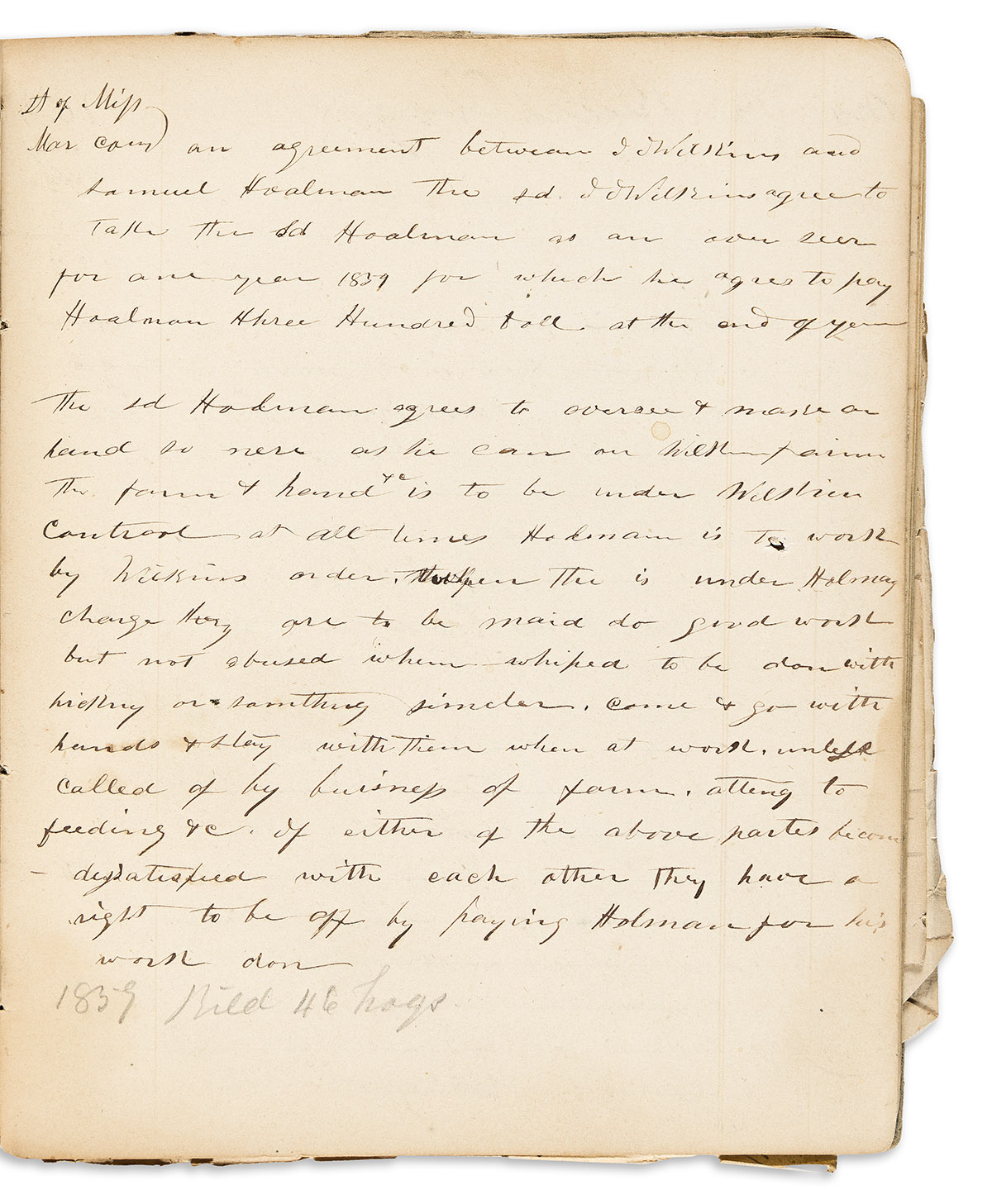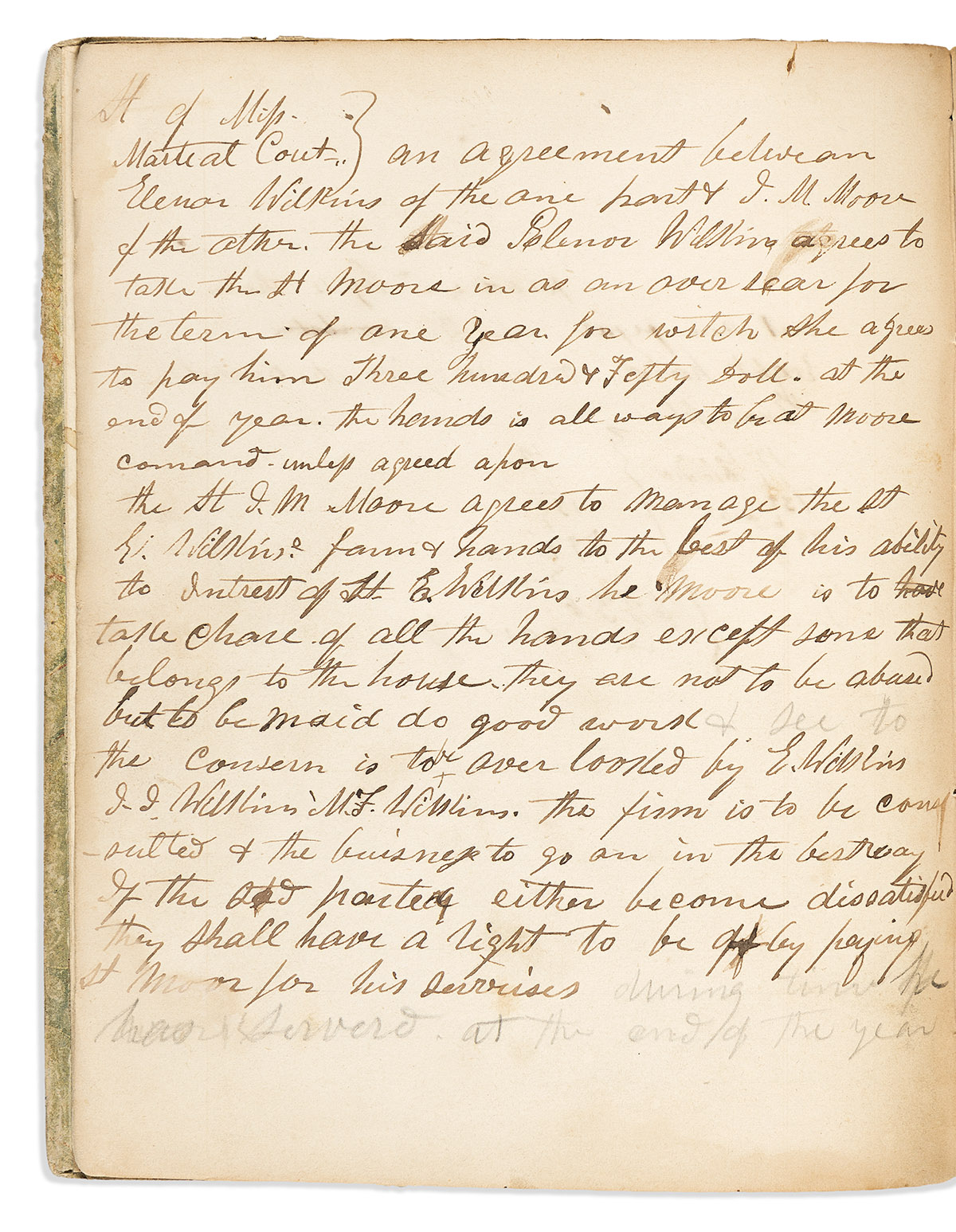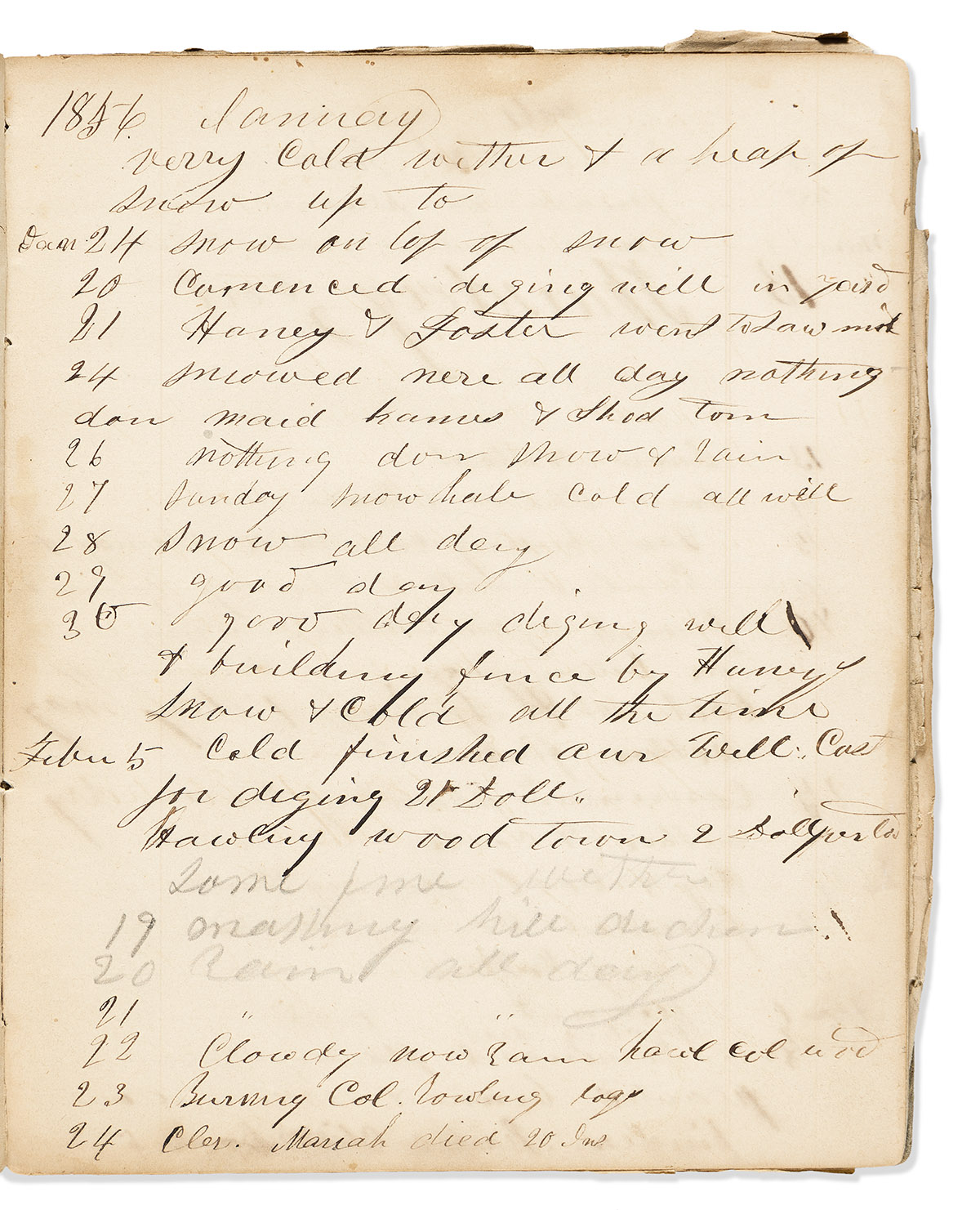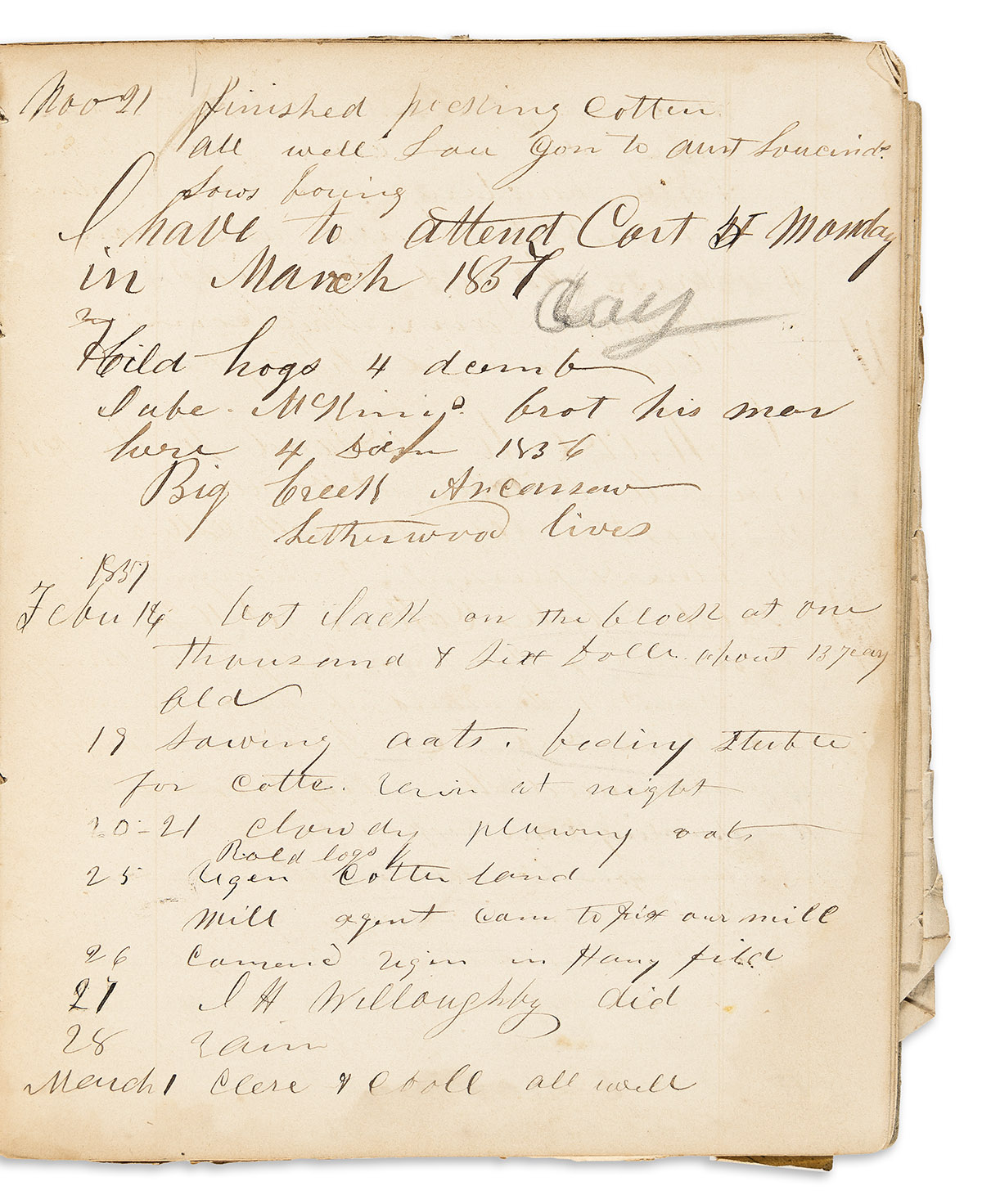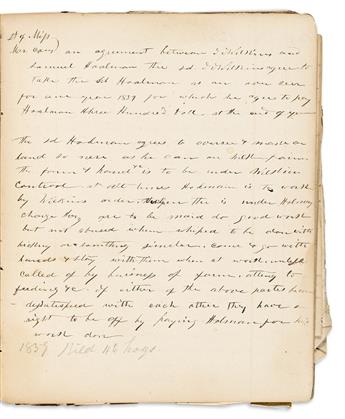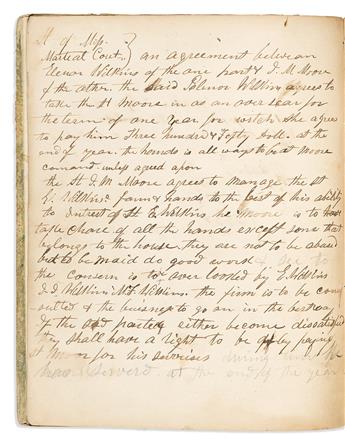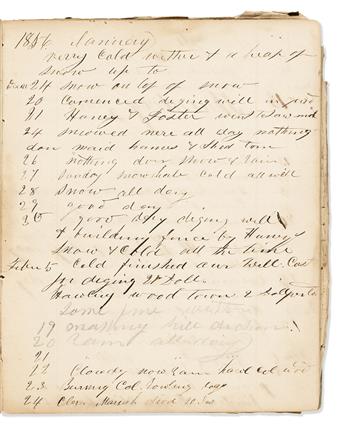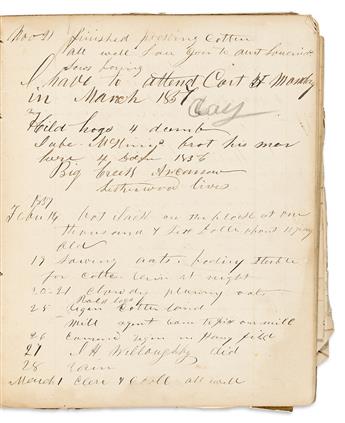Sale 2663 - Lot 420
Unsold
Estimate: $ 7,000 - $ 10,000
(SLAVERY.) Diary of a Mississippi cotton planter, including agreements with overseers. [91] manuscript diary pages plus [37] pages of memoranda. Quarto, 7¾ x 6 inches, original ¼-calf, worn; contents also worn, coming disbound, some leaves detached or loose, others stitched in from different volumes, at least one diary leaf lacking. Marshall County, MS, 1851-1862
Additional Details
A plantation's new overseer is instructed: "When whiped, to be done with hickory or something similar."
The diary which fills most of this volume begins on 1 January 1855 and continues through 13 August 1862. It was kept by John Jeffries Wilkins (1815-1876), who had come from South Carolina to Marshall County, Mississippi in the late 1840s. He owned a fairly large cotton plantation, and is recorded in the slave schedule of the 1860 Marshall County census with 26 enslaved people living in 7 slave houses.
His diary consists mostly of very short entries regarding the progress of work on the plantation. Discipline and daily tasks were handled by an overseer, and not generally discussed here. He mentions at least two purchases of enslaved people. On 14 February 1857 he writes "Bot Jack on the block at one thousand & six dolls, about 13 years old." On 7 April 1858 he writes "Bot Lucy from Dan Mosley." He also notes his own benevolence on 2 July 1859, just before Independence Day: "Holida dinner to Negros."
Some entries note the births of children in his own family, and at least one discusses his attendance at a religious revival meeting: "Came home from camp meeting @ Conants cold meeting. This is the last camp meeting at that place unless I change my notion much. Long ways & unpleasant place, a heap troble & short prophet" (31 August 1857). Politics are largely absent until the secessionist movement gathered steam in late 1860. On 1 September of that year he writes "Went to town. Herd some speaches." On 22 September, "Joined the K.G.C. at Watterford." The Knights of the Golden Circle were a pro-slavery secessionist secret society. On 20 December he wrote "Election for delegates to convention cesesion," and 4 days later, chillingly, "Bot my pistel." Once the war begins, several entries discuss the formation of regiments and local militia units, as well as a "Confederate fast day" (13 June 1861) and a "Davis fast day" (16 May 1862). Battles at Manassas and Corinth are noted, and then on 16 June 1862, "The Federals came to town. They apere sivel." On 21 June, Wilkins apparently issued a ration of a scarce resource to his enslaved workers: "Gave meet to Negros untill 22 of August." The final entry on 13 July reads "All well. Dry. Prospect gloomy." Soon afterwards, the diary was picked up in a "deserted house" by a Union soldier.
In addition to the diary entries, the volume also includes two draft agreements between the Wilkins family and plantation overseers they hired. The first is undated but names J.J. Wilkins's mother Elenor Wilkins as owner; she died in November 1854. For $350 covering one year, J.M. Moore "is to take charge of all the hands except some that belongs to the house. They are not to be abused but maid to do good work." Following the December 1858 diary entries, another agreement is made with overseer Samuel Hoalman, this time for $300. It specifies that the hands "are to be maid do good work but not abused. When whiped, to be done with hickory or something similar. Come & go with hands & stay with them when at work, unless called of by business of farm."
On the second page is what appears to be a daily tally of work done by 6 enslaved people: John, Nance, Hannah, Foster, Ann, and Meeler. A similar list for September 1853 is headed "Comenced picking cotton at sundry times."
Provenance: taken as contraband by the Union army per an 1862 note on the inside board: "Diary picked up at a deserted house on march in pursuit of Price, Tallahatchie, J.W. Boyd." This diary ends in July 1862, and Confederate General Sterling Price was active in northern Mississippi at Iuka and Corinth in the early fall of 1862.
The diary which fills most of this volume begins on 1 January 1855 and continues through 13 August 1862. It was kept by John Jeffries Wilkins (1815-1876), who had come from South Carolina to Marshall County, Mississippi in the late 1840s. He owned a fairly large cotton plantation, and is recorded in the slave schedule of the 1860 Marshall County census with 26 enslaved people living in 7 slave houses.
His diary consists mostly of very short entries regarding the progress of work on the plantation. Discipline and daily tasks were handled by an overseer, and not generally discussed here. He mentions at least two purchases of enslaved people. On 14 February 1857 he writes "Bot Jack on the block at one thousand & six dolls, about 13 years old." On 7 April 1858 he writes "Bot Lucy from Dan Mosley." He also notes his own benevolence on 2 July 1859, just before Independence Day: "Holida dinner to Negros."
Some entries note the births of children in his own family, and at least one discusses his attendance at a religious revival meeting: "Came home from camp meeting @ Conants cold meeting. This is the last camp meeting at that place unless I change my notion much. Long ways & unpleasant place, a heap troble & short prophet" (31 August 1857). Politics are largely absent until the secessionist movement gathered steam in late 1860. On 1 September of that year he writes "Went to town. Herd some speaches." On 22 September, "Joined the K.G.C. at Watterford." The Knights of the Golden Circle were a pro-slavery secessionist secret society. On 20 December he wrote "Election for delegates to convention cesesion," and 4 days later, chillingly, "Bot my pistel." Once the war begins, several entries discuss the formation of regiments and local militia units, as well as a "Confederate fast day" (13 June 1861) and a "Davis fast day" (16 May 1862). Battles at Manassas and Corinth are noted, and then on 16 June 1862, "The Federals came to town. They apere sivel." On 21 June, Wilkins apparently issued a ration of a scarce resource to his enslaved workers: "Gave meet to Negros untill 22 of August." The final entry on 13 July reads "All well. Dry. Prospect gloomy." Soon afterwards, the diary was picked up in a "deserted house" by a Union soldier.
In addition to the diary entries, the volume also includes two draft agreements between the Wilkins family and plantation overseers they hired. The first is undated but names J.J. Wilkins's mother Elenor Wilkins as owner; she died in November 1854. For $350 covering one year, J.M. Moore "is to take charge of all the hands except some that belongs to the house. They are not to be abused but maid to do good work." Following the December 1858 diary entries, another agreement is made with overseer Samuel Hoalman, this time for $300. It specifies that the hands "are to be maid do good work but not abused. When whiped, to be done with hickory or something similar. Come & go with hands & stay with them when at work, unless called of by business of farm."
On the second page is what appears to be a daily tally of work done by 6 enslaved people: John, Nance, Hannah, Foster, Ann, and Meeler. A similar list for September 1853 is headed "Comenced picking cotton at sundry times."
Provenance: taken as contraband by the Union army per an 1862 note on the inside board: "Diary picked up at a deserted house on march in pursuit of Price, Tallahatchie, J.W. Boyd." This diary ends in July 1862, and Confederate General Sterling Price was active in northern Mississippi at Iuka and Corinth in the early fall of 1862.
Exhibition Hours
Exhibition Hours
Aliquam vulputate ornare congue. Vestibulum maximus, libero in placerat faucibus, risus nisl molestie massa, ut maximus metus lectus vel lorem.



